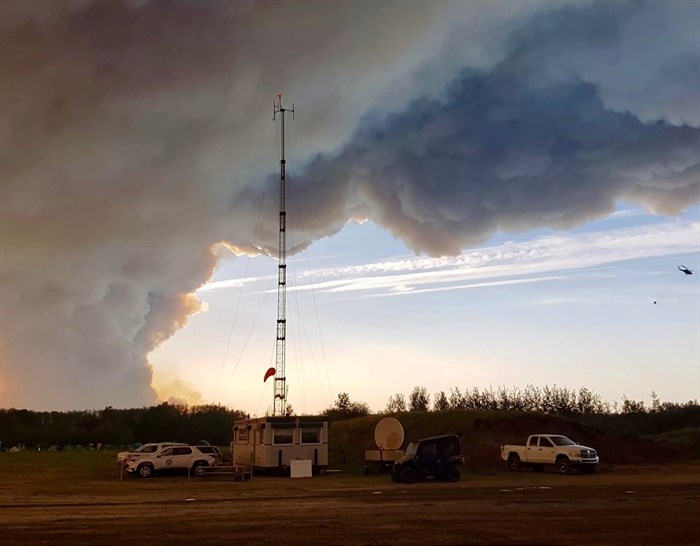
The Chuckegg Creek wildfire in the High Level area is pictured in this Alberta Wildfire photo posted to Facebook. The Alberta government says wildfires raging across the northern part of the province have forced about 10,000 people from their homes.
Image Credit: FACEBOOK/Alberta Wildfire
May 30, 2019 - 5:05 PM
The Alberta government says wildfires raging across the northern part of the province have forced about 10,000 people from their homes.
The updated figure was provided Thursday afternoon, after a day of hot temperatures and gusty winds led to the explosive growth of several blazes burning out-of-control.
About 5,000 people have been out of their homes in and around High Level for more than a week and a series of smaller communities, including Wabasca, the Bigstone Cree Nation and Chipewyan Lake Village, have fallen under evacuation orders since Wednesday.
People in Slave Lake, a town that was partially destroyed in a 2011 blaze, have been told to be prepared to leave with eight hours notice because of a fire that the mayor says is burning about 30 kilometres away.
Smoke from the fires enveloped points south, including Edmonton, in a thick, acrid, haze that limited visibility and made it difficult to breathe.
The government said weather forecasts for the next two weeks will make fighting the fires difficult. Firefighters were in Alberta from across Canada doing their best to corral the flames.
"This fight is going to be a tough one," said Devin Dreeshen, Alberta's minister of agriculture and forestry. "The weather is not co-operating for the long-distance forecast for the next two weeks. It's more of the same, of hot, dry and windy conditions.
"Albertans need to prepare themselves for this situation for the foreseeable future."
Across the province, there were 28 active fires and nine were considered out-of-control.
While an evacuation order was issued Thursday afternoon for the hamlet of Marten Beach, about 20 kilometres north of Slave Lake, Slave Lake Mayor Tyler Warman said the fire was not an immediate threat to his community.
"We've got a fire, that started around the same time as the High Level one, that's been north of town for awhile," Warman said. "The wind conditions and the extreme dryness have pushed some of it closer to town."
"The MD has declared a local state of emergency because of that, but we're not panicked at this point," said Warman, who was a town councillor and firefighter during the 2011 wildfire that raced through part of Slave Lake, destroying more that 400 homes and buildings.
He said the fires are bringing back memories.
"We are more prepared than we have ever been. We're more cautious than we have been in the past."
The biggest blaze was the Chuckegg Creek fire raging near High Level, which covered 2,300 square kilometres Thursday.
Derek Gagnon, a provincial information officer, said that fire grew by 800 square kilometres in 24 hours and travelled more than 22 kilometres on the ground.
"The average speed would then be around 23 metres per minute," he said. "We had really strong winds out of the north that combined with really dry fuels."
While the flames have been kept out of High Level, Mayor Crystal McAteer, Reeve Josh Knelsen of Mackenzie County and Dene Tha' First Nation Chief James Ahnassay issued a joint statement urged residents who were out of their homes to be patient.
"We know that many of you are very anxious to hear about what is happening with the wildfire and the situation in our communities. Many of you have been out of your homes and away from your work for a long time." they wrote.
"We simply don't know for sure what this fire will do next."
There were reports that some homes were damaged in Paddle Prairie Metis Settlement south of High Level, but provincial officials couldn't confirm that.
Meanwhile, people in Edmonton spent most of Thursday dealing with a thick, smoky haze that turned otherwise blue skies an eerie grey-orange.
Environment Canada issued a special air-quality statement for the Alberta capital region and expanded it to most of the province Thursday afternoon.
"Shifting winds are causing the smoke to drift and most of Alberta will be impacted by this smoke in the coming days," said Dreeshen.
"Smoke is a huge factor in this challenge for not only for health reasons but for the wildland firefighters on the ground. The loss of visibility makes it extremely difficult to use air supports."
News from © The Canadian Press, 2019